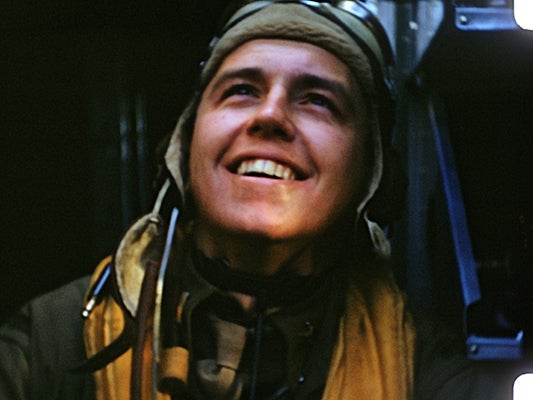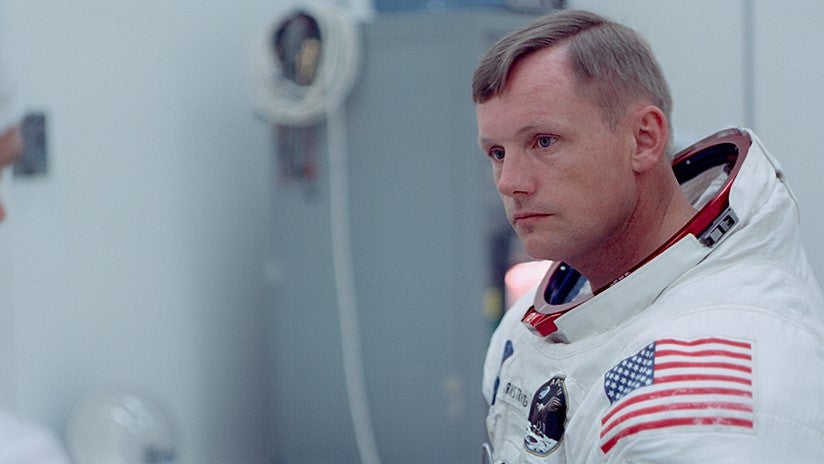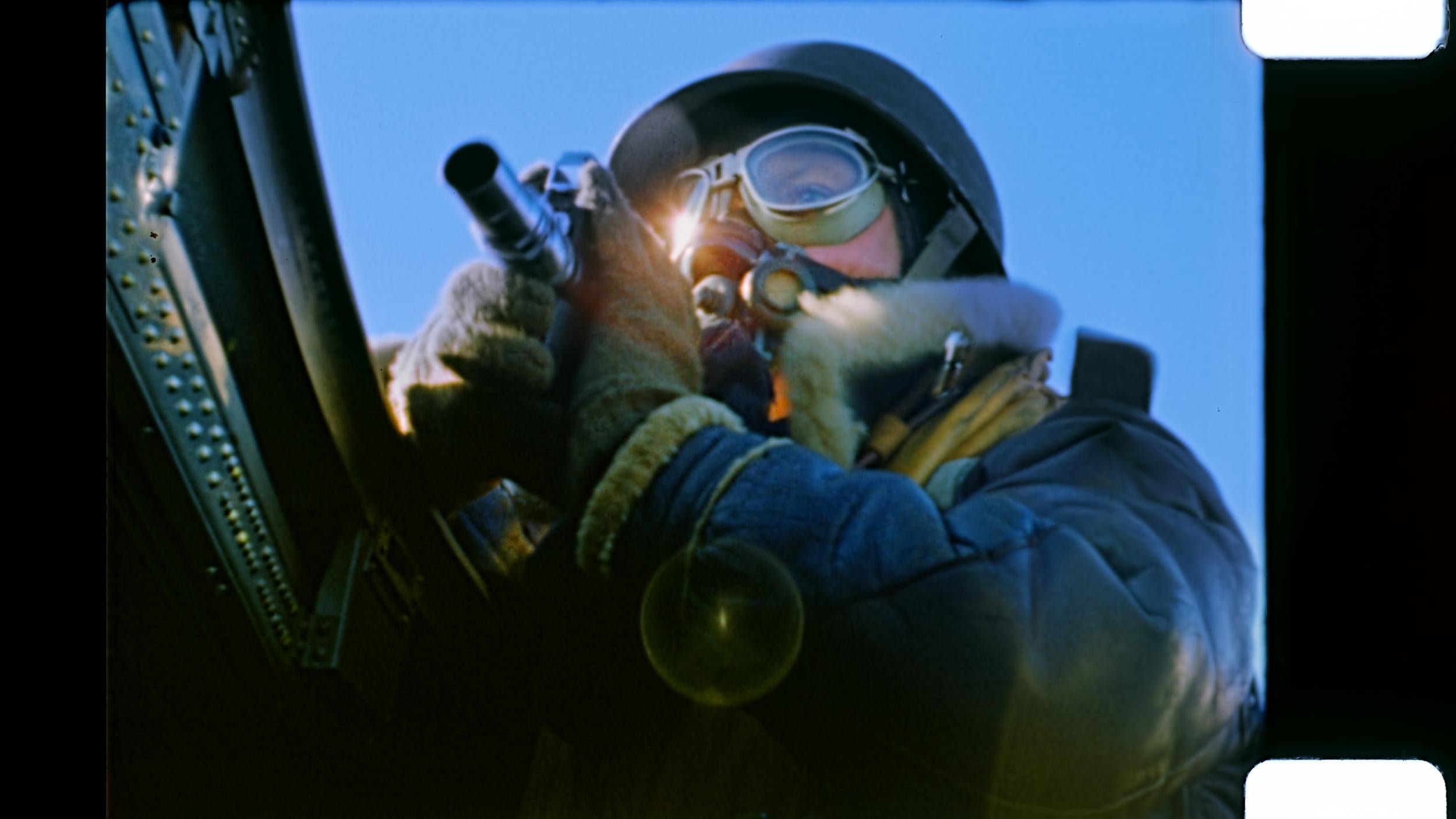Historical documentaries are entering their golden era thanks to modern technology
Inside Film: Following in the path of ‘They Shall Not Grow Old’ and ‘Apollo 11’, ‘The Cold Blue’ is the latest film to give surprising new life to old archive material

Eggs have seldom had such a sinister connotation. Generally, the US air force crew members whose stories are told in new feature documentary The Cold Blue were given powdered food for breakfast. But on the mornings of especially dangerous bombing missions over Germany, fresh eggs were served up. The young Americans came to see them as the harbingers of doom. They wolfed them down like condemned men eating their final meal. One crew member remembers the vexed and apprehensive feelings that the eggs stirred up: “We don’t want fresh eggs but we want fresh eggs.”
The Cold Blue is an entirely new film edited together largely from 15 hours of 16mm footage courtesy of legendary Hollywood director William Wyler. He and his team shot B-17 bomber crews during their missions over Germany for his 40-minute film Memphis Belle: A Story of a Flying Fortress (1944). The rest of the footage had lain neglected in the national archives in Washington for 75 years.
Directed by Erik Nelson, the producer of Werner Herzog films Grizzly Man (2005) and Cave of Forgotten Dreams (2010), this is one of a number of recent films which have used digital technology to give surprising new life to old archive material. Peter Jackson’s First World War film They Shall Not Grow Old, and the recently released Apollo 11, also make historical footage look as if it was shot yesterday.
Jackson’s name and reputation have provided these films with a commercial traction they might not otherwise have had. Thanks to the Lord of the Rings director, they are being given major cinema releases rather than being confined to the festival circuit or to TV.
There is something extraordinarily poignant about the films. They Shall Not Grow Old and The Cold Blue celebrate the everyday bravery of their subjects, while also exposing viewers to the apocalyptic violence they endured – and sometimes inflicted, too. They are chronicles both of heroism and of horror. Apollo 11, meanwhile, uses previously undiscovered 70mm footage from the launch of the first space rocket to take humans to the moon.
The films touch audiences in a way that more traditional documentaries, using grainy black and white footage and conventional talking head interviews, don’t. They have an immediacy and a freshness. We feel as though we are watching our contemporaries, not historical figures.
“We could get into a deeper conversation about what is it about the times today where people almost need an escapism into a heroic past,” Nelson tells me. “There is something that is driving audiences right now to see these films in the United States and the UK. I think it has to do with the shifting sands of the political system.” He talks of trying to make a wartime documentary that played like an art film: “a Koyaanisqatsi with B-17s”.

The Cold Blue is far franker than Wyler’s Memphis Belle, which was made for propaganda purposes. Nelson includes one particularly macabre image that Wyler, for obvious reasons, left out of the 1944 documentary. It is of the front of a B-17 with the nose shot off. You can clearly see the arterial spray of blood on the Plexiglass where the crew member has just been vaporised. We also hear grim stories, such as the one about a pilot passing out in the cold and his hands freezing to the window. (His fingers had to be amputated.)
In the 4K restoration, the detail is startling. You can see the light gleaming off the crew members’ leathers. The skies are cobalt blue. Slow motion footage of the American planes dropping their bombs on the German cities below has a mesmerising but ghoulish beauty. Equally striking, but for different reasons, is the film of the young Americans enjoying themselves off duty in Britain. There were hundreds of thousands of them stationed here during the so-called “friendly invasion”. Playing tennis, having snowball fights or flirting with the local women, they look as if they could be on leave from some 1960s American high school movie.

Nelson also includes footage of Berlin after it has been bombed to smithereens. (This was shot not by Wyler but by a unit led by his fellow Hollywood director, John Sturges.) There is a surreal image of a well-dressed woman dragging a cart through the rubble-strewn streets. The cart is full of firewood. A child, presumably her daughter, is sitting on the logs. The woman is barefoot. This is a modern European city reduced to primitive desperation.
The Cold Blue was backed by the American billionaire and co-founder of Microsoft, Paul Allen, who died last year. “He was a rabid World World War Two buff as I am,” says Nelson of his patron. “The difference was that Paul Allen, with a $25bn fortune, was able to collect World War Two airplanes and get them to fly.”
Allen saw the film before he died, and gave Nelson only one script note. In an earlier version, the filmmakers used swinging, upbeat Glenn Miller music over the footage of bombed out Berlin in an ironic, triumphalist way. Allen asked for it to be changed, and Nelson agreed. The score to The Cold Blue is written by folk guitarist Richard Thompson (with whom Nelson also worked on Herzog’s Grizzly Man).
In the documentary, we hear the voices of the few surviving crew members from the raids (all now in their 90s) as we see footage of them as very young men. Twenty-six was considered old among the crew members, most of whom were in their early 20s – and some were still teenagers. As they reminisce, the years fall away and they undergo a strange transformation. They talk as if they have been transported 70 years to their early adulthood. They use expressions and sing songs from long ago. There is obvious pathos in this journey back in time.
The effect is similar to that found in Dutch-based director Heddy Honigmann’s 2012 documentary Memories of Fire, about the bombing of Rotterdam by the German air force in May 1940. Honigmann interviewed survivors of the bombing. They are all old men and women now but they were kids then. As they talk on camera about holding their parents’ hands during the bombing and the parents being helpless to protect them, they sound as helpless as they would have done at the time of the bombing. It’s as if they are reverting to their childhood selves.
There is a sad and grisly postscript to The Cold Blue. Vincent Losada, one of the surviving crew members whose voiceover features in the film, had seen The Cold Blue at an early screening. He was 93 and had lost arm due to flak injuries in 1944. He loved the film and appeared in a “making of” documentary, enthusing about it. A few weeks after the screening, he was at an airshow in Fredericksburg, Texas, and asked to be allowed to fly again in the back seat of a 1940s aircraft. It crashed into an apartment parking lot and he was killed alongside the pilot.
As the film reveals, 150,000 men flew with the 8th Air Force, flying nearly three million combat missions over Europe. The fatality rate was enormous. One of Wyler’s cinematographers, Harold Tannenbaum, was killed when the plane on which he was filming was shot down. The Cold Blue is dedicated to Tannenbaum, Losada and to all the others who died. It is one of those history documentaries that demands to be seen on the big screen, and that makes long ago events seem vivid, contemporary and very haunting.
‘The Cold Blue’ is showing at selected cinemas later this month. ‘Apollo 11’ is out in UK cinemas now
Join our commenting forum
Join thought-provoking conversations, follow other Independent readers and see their replies
Comments